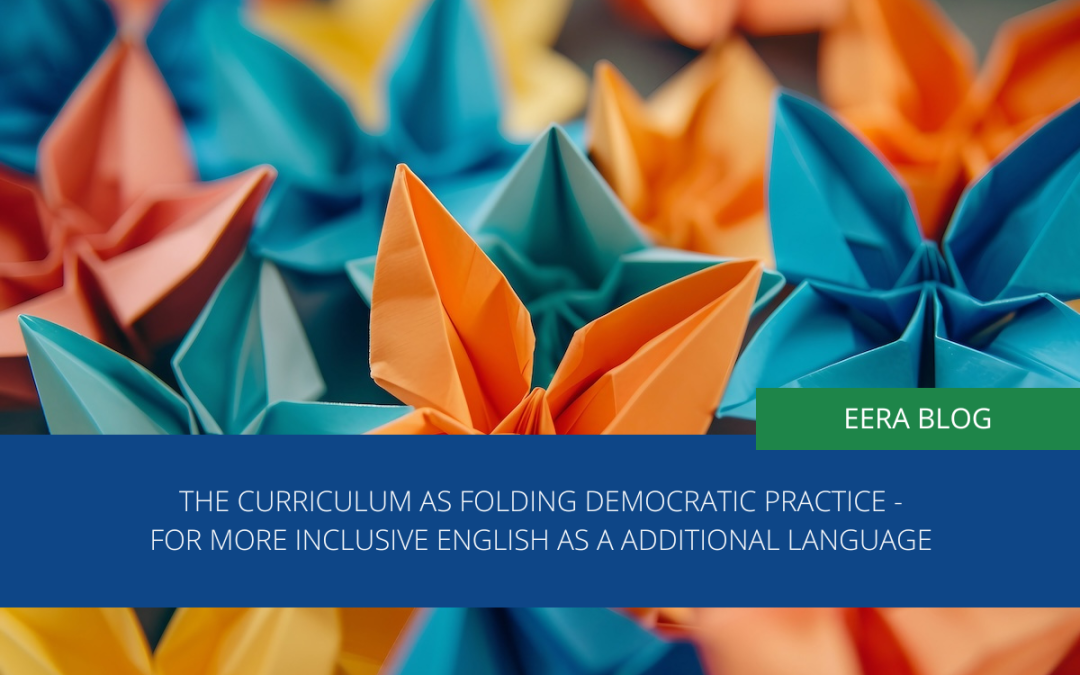In today’s multilingual world, with approximately 7,000 spoken or signed languages, at least half of the global population is bilingual. Reflecting this diversity, Australia’s population is remarkably multicultural, with 29.5% born overseas and nearly 250 languages spoken in homes. This linguistic richness calls for an educational framework that mirrors these realities. In response, the English as an Additional Language (EAL) curriculum in Australia is at a crucial juncture, where it must bridge monolingual norms (e.g., Standard Australian English) with the multilingual realities of classrooms.
Drawing on Deleuze, Dewey, and Bill Green’s “curriculum as practice,” our research introduces the concept of “curriculum as ‘folding’ democratic practice”. This holistic, fluid, and processual approach, premised on the lived experiences of 16 immigrant EAL teachers, underscores the need for a more responsive and democratic educational framework.
Assembling Theory and Practice: A Democratic Approach

In “curriculum as ‘folding’ democratic practice”, John Dewey’s focus on experiential learning complements Deleuze’s concept of the “fold,” shaping a curriculum that is fluid, multifaceted, experimental, and responsive to linguistic and cultural diversity. Teachers use their lived experiences to shape a dynamic, evolving learning environment, akin to origami, where each fold represents collaborative interactions between students and educators.
Transcending Traditional Boundaries: Teachers’ Narratives
Incorporating the lived experiences of teachers from diverse backgrounds, our study highlights the transformative potential of a curriculum that transcends traditional, rigid frameworks. These educators, through their critical reflections and navigation of the complexities of language learning and teaching in various cultural contexts, offer invaluable insights into creating a responsive and inclusive educational environment. Their perspectives underscore the importance of embracing flexibility and cultural diversity to enhance the democratic educational experience for all students.
Jasha – bringing text to life with visualisation
For instance, Jasha’s early encounters with the English language were far from inspiring. Growing up in the USSR, she described her lessons as “boring texts to read, boring lessons on grammar, no listening and no speaking”. However, a transformative moment came when she volunteered to accompany a teacher to a bookshop when she was in year VIII and discovered Oscar Wilde’s “The Picture of Dorian Gray”. This book ignited her passion for English, leading her to adopt a more student-centred philosophy in her teaching in a transnational context.
Today, Jasha emphasizes fairness, equality, mutual respect and cultural responsivity in her classroom, recognizing the global diversity inherent in the English language onshore and offshore. She uses a method called visualisation, encouraging students to see a text and be part of the story. This makes English more relatable and memorable. For example, with the “boring, Eurocentric lesson on railway journeys” in “Language Leader”, she asks students to imagine being on a train, recalling scenes from “Harry Potter”, and enjoying the “view”:
And suddenly the most boring reading (and it is really really boring!!!) comes alive. (Jasha)
This approach brings the text to life and fosters lively class discussions about cultural concepts of a “journey” and “destination”.
Janaki – including cultural elements in student engagement
Janaki transformed a curriculum-mandated employment project into a charity event that raised over $1,000 for the Save the Children Foundation through activities like a garage sale and morning tea. While these are common in Australia, Janaki encouraged her refugee students to incorporate cultural elements from their home countries into the event’s planning and execution. Reflecting on this, she remarked, “This experience showed me how capable the student cohort is when it comes to collaborating across cultural differences to achieve impactful results”. The initiative not only fostered student deep engagement but also promoted intercultural identity development through profound experiential learning.
The Fold of English Learning and Professional Becoming
Frida and Natalie – learning through playful interactions The journey of English language learning for these teachers often began with playful, informal interactions. Frida, from the Philippines, fondly recalled playing language games like “Pictionary” and “Scrabble” with her grandmother, which nurtured her love for English. She also immersed herself in reading borrowed books from “a neighbour” and “the local library”. Similarly, Natalie from Bangladesh was captivated by her father’s translanguaging storytelling, particularly his renditions of “Paradise Lost” by John Milton, especially the line, “জাগো, ওঠো না হলে চিরতরে পড়তে থাকো”, (“Awake, arise or be for ever fall’n”). These affective familial and cultural contexts served as rich, informal educational platforms, aligning with Deleuzian concepts of becoming and multiplicity, where learning evolves through diverse, non-linear pathways both within and beyond the learner.
Mahati –
In Australia, the personal and professional education of these teachers further shaped their understanding and practice of the curriculum. Mahati, originally from India, experienced a stark contrast between the rigid educational frameworks overseas what Australian curriculum and the more communicative, student-centred approach in Australia. During her TESOL teaching practice rounds at the Western English Language School, she embraced innovative teaching techniques that significantly differed from her experiences in India and Uganda, as well as from the monologic curricula in Australia. This exposure enabled her to critically reflect and further adapt her methods to better meet the multilingual and intercultural needs of her students, thereby developing her own hybrid professional becoming (identity). In this context, Mahati also intertwined her knowledge of English literature and grammar into her teaching practice. For instance, she often incorporated insights from T.S. Eliot, particularly his idea about the importance of recursive interpretation, to deepen students’ understanding of texts and their meanings.
“He said, every time I read something again and again, I find new meaning and new beauty in that.” (Mahati)
To enhance understanding, she connected this to the Urdu terms “ شاعر” (shayar/shaa’ir: poet) and “ “شاعری (shayari: poetry). This approach not only leveraged the full linguistic repertoire of the multilingual learners but also amplified their affective connection with the material.
Ling Ling and Becca –
Ling Ling, influenced by her Chinese, Japanese, and English background, emphasizes teaching both culture and language, stating, “I am teaching the ‘culture’ as well as the language”. Similarly, Becca interweaves grammar into communicative, student-centered methods, explaining, “Grammar is a tool for effective communication, not the main goal,” transforming traditional exercises into interactive, engaging and affective activities that enrich the learning process.
Summary
The personal journeys of these English teachers highlight the transformative power of a responsive EAL curriculum. By leveraging their lived experiences and adopting culturally responsive strategies, they have enhanced both the enjoyment and effectiveness of language learning, shifting from traditional to learner-centered practices. This underscores the role of ethical, dialogic teaching in enriching education.
Looking ahead, the concept of “curriculum as ‘folding’ democratic practice” provides a framework for fostering intercultural and cosmopolitan development – an ongoing, evolving process of shaping education through inclusive, differentiated and dynamic methods that interlace diverse perspectives and experiences, fostering democratic learning environments. By adapting to the diverse experiences of teachers and students, the curriculum can transcend traditional boundaries and create an inclusive, democratically engaged learning environment.
At its core, teachers’ narratives point to the potential for reform in Australia’s educational landscape. Drawing on Dewey’s democratic education and Deleuze’s philosophy, a non-linear, decentred curriculum can celebrate linguistic and cultural diversity, preparing students for global participation. This study offers transformative EAL approaches with broader implications, suggesting that curricula rooted in multilingual and intercultural principles can promote inclusivity and enrich education across disciplines.
Key Messages
- Curriculum as ‘Folding’ Democratic Practice: The blog presents a flexible, evolving approach to EAL education that incorporates diverse linguistic and cultural experiences.
- Teacher Experiences as Catalysts for Transformation: Multilingual immigrant EAL teachers’ lived experiences are central to shaping a more responsive and inclusive curriculum.
- Bridging Monolingual Norms with Multilingual Realities: The blog advocates for moving beyond monolingual norms to reflect Australia’s multilingual classroom realities.
- Combining Deleuzian and Deweyan Philosophies: Entwining Deleuze’s ‘fold’ and Dewey’s experiential learning fosters a democratic, fluid, non-linear, and culturally inclusive approach to curriculum design.
- Promoting Cosmopolitanism and Intercultural Learning: The blog emphasizes EAL education’s role in fostering intercultural understanding and world outlook among students.

Dr Nashid Nigar
Faculty of Education, University of Melbourne, Australia
Dr Nashid Nigar teaches at the Faculty of Education, University of Melbourne, and has diverse experience in English language and literacy teaching, academic writing, and teacher education. Her recently completed Ph.D. thesis, focusing on language teacher professional identity at Monash University, was graded as Exceptional—Of the highest merit, placing within the top 0.1% to fewer than 5% of international doctorates. Her ongoing research interests include language teacher professional identity and language/literacy learning and teaching.

Professor Alex Kostogriz
Faculty of Education, Monash University, Melbourne, Australia
Professor Alex Kostogriz holds the esteemed position of Professor in Languages and TESOL Education within the Faculty of Education at Monash University. He currently serves as the Associate Dean (International) within the faculty. Alex’s ongoing research endeavors are centered around the professional practice and ethics of language teachers, as well as the realms of teacher education and the early experiences of novice educators.
Other blog posts on similar topics:
-
Nigar, N., Kostogriz, A., & Mhilli, O. (2024). Curriculum as ‘folding’ democratic practice: Integrating Deleuzian and Deweyan philosophies with the lived experiences of English teachers. Curriculum Perspectives. https://doi.org/10.1007/s41297-024-00258-7
-
Nigar, N., Kostogriz, A., & Gurney, L. (2024). Becoming an English language teacher over lines of desire: Stories of lived experiences. Australian Educational Researcher, 51, 1749–1770. https://doi.org/10.1007/s13384-023-00662-4
-
Green, B. (2022). Understanding curriculum as practice, or on the practice turn(s) in curriculum inquiry. Curriculum Perspectives, 42(1), 77–83. https://doi.org/10.1007/s41297-022-00160-0
-
Dewey, J. (1916). Democracy and education. The Macmillan Company.
-
Deleuze, G. (1993). The fold: Leibniz and the baroque. University of Minnesota Press.

